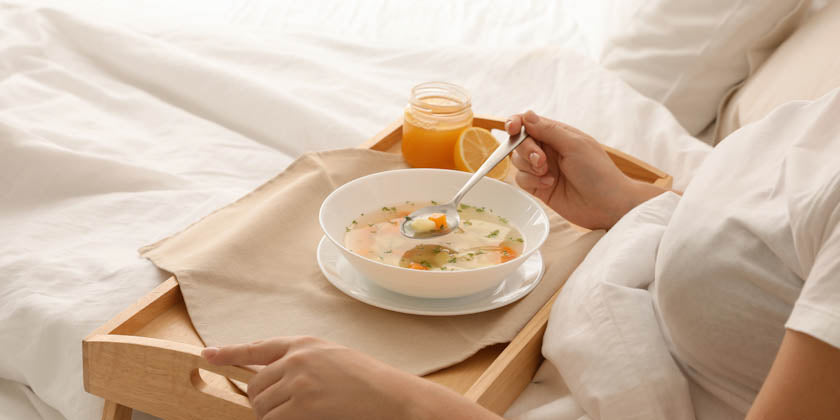No matter what culture you hail from, you probably crave broth or chicken soup when you're sick. It's certainly comforting to reach for what we were given as children, but why is there merit to the reflex? What makes chicken soup the best cold remedy? Traditional Chinese Medicine theory explains the classic cold buster through this nutritional lens.
The Onion and Ginger: The Ultimate Immune Support
The ultimate basic immune support is hot water with green onion and ginger slices. Both spring onion (or scallions, cong bai in pinyin Chinese) and fresh ginger (sheng jiang) are in a category of herbs that release the exterior of the body, inducing a slight sweat and helping to expel pathogens (what we might understand as germs). From a pharmacological perspective, both ginger and spring onion have antibacterial properties and ginger is also anti-inflammatory, antipyretic (brings down fever), and analgesic (relieves pain) (source: Chen & Chen, Chinese Medical Herbology and Pharmacology). This simple two herb pairing works best when you are in the very early stages of a cold as this is gentle medicine.
For an integrative mixture of Eastern and Western medicine, adding lemon provides Vitamin C and flavor, but keep it light – just a slice or small squeeze – as you don't want to astringe the pathogen into the body. Just as the sourness of lemon makes you pull your lips into a pucker, Chinese medicine theory states that foods with a sour flavor can pull in and reserve, so they can have that function with what you're trying to expel if you overdo it.
If your throat is sore, stirring in a spoonful of local honey (feng mi) will both boost your immune system and soothe dryness.
Once a cold has developed, you need a bit more support. We stay comparatively light as a cold affects what we consider the outer layer of the body (compared to the muscle or bone layer).
Colds can go deeper to the organ layers if untreated or due to a strong pathogen (think pneumonia directly and very physically clogging up the lungs). When in doubt, see your acupuncturist for a treatment and get the best prescription for you. The sooner you are treated, the more likely it is that acupuncture will be able to help decrease the duration and severity of your cold.

The Chicken and Broth: Supporting Your Spleen & Qi
When we add chicken and broth to the mix, we're making something nourishing rather than just releasing.
The Spleen (the Chinese medical organ system/concept, not the anatomical or physical organ) is in charge of taking food and turning it into Qi or energy. The Spleen needs a warm, wet environment to do its best work and becomes sluggish or damaged when fed too much cold, damp, or sweet. Chinese medicine classifies foods by a value we call temperature, and uses temperature to treat its opposite with the strength of its degree (warm foods treat cold conditions more gently than hot foods do).
The temperature value doesn't change based on whether the dish is served hot or cold; rather it is intrinsic to the food itself (which is more a problem with the English translation of temperature than the Chinese terminology). It does still help to serve soup at a warm temperature as we know from a Western perspective it takes energy (calories) to digest cold foods and we want to conserve our energy when our body is trying to direct its efforts to immune function.
The Spleen sends the Qi it creates from food to the Lungs (again, conceptual organ system), which control the opening and closing of the pores, guarding the body from pathogenic entrance and ensuring appropriate sweating as a regulating and protective action. Thus, the best food we can give the Spleen when the body is already under attack from pathogens is warm, wet, and easily digestible: soups and stews.
Broth has a lot of nutrition packed into a warm and wet delivery system. According to Chinese Medicine theory, chicken is considered warm and has a balanced nourishing action as compared to other meats like lamb, which is hot or pork, which is cool.

Meatless Options: Keep it Warm & Easy
If you're vegetarian or vegan, you can make or use a veggie broth and skip the meat. The key is warm, easy to digest foods that provide a light serving of salt and protein when the body only has energy for small meals. Again, soups and stews are your friend.
Considerations and Other Substitutions
-
If you don't love ginger, substitute a cinnamon stick (gui zhi) or two for fresh ginger slices
-
Profuse sweating: stop using spring onions
-
Hypertension: avoid high doses of ginger
-
Pregnancy or heavy menses: limit dosage of cinnamon
What to Avoid
As tasty as they are, wait until you're back to health to enjoy the following sweet, cold foods in moderation. They dampen your healing efforts by increasing mucus, slowing down the Spleen, and generally decreasing immune function:
-
Orange Juice (with pulp): the Vitamin C is wonderful, but the pulp increases mucus
-
Ice Cream: increases mucus, sugar depresses immune function
-
Yogurt: increases mucus
-
Milk, cheese, dairy: all increase mucus
-
Eggs: increase mucus, but great for dry cough as they tonify health Yin fluids rather than dampen pathogenically
-
Sweets and sugar in general: depress immune function
-
Alcohol: depresses immune function
Care Consideration: Just a reminder that the above information is not a substitute for medical care and is not a substitute for medical advice or recommendations from a healthcare provider. This information is not intended to treat, mitigate or cure any disease. That said, we encourage you to connect with an Acupuncturist in your community to learn more about this and other Traditional Chinese Medicine options. If you’ve got questions about Chinese herbal medicine or getting started with an Acupuncturist, feel free to connect with us on hello@mydaolabs.com.
















